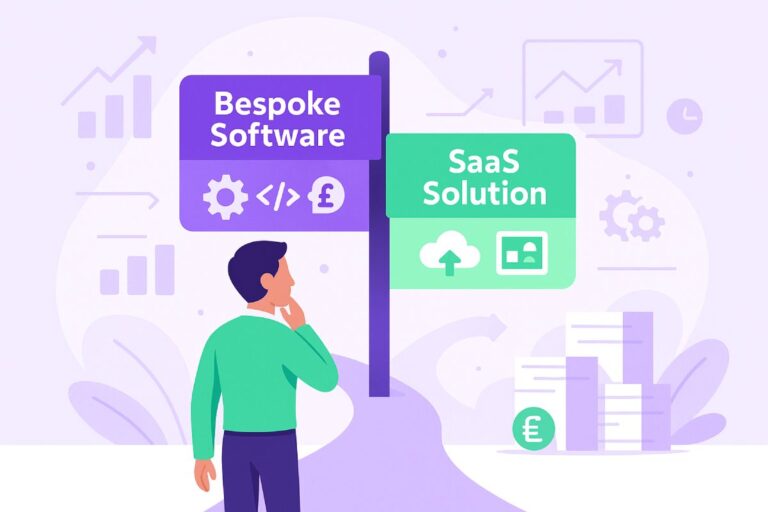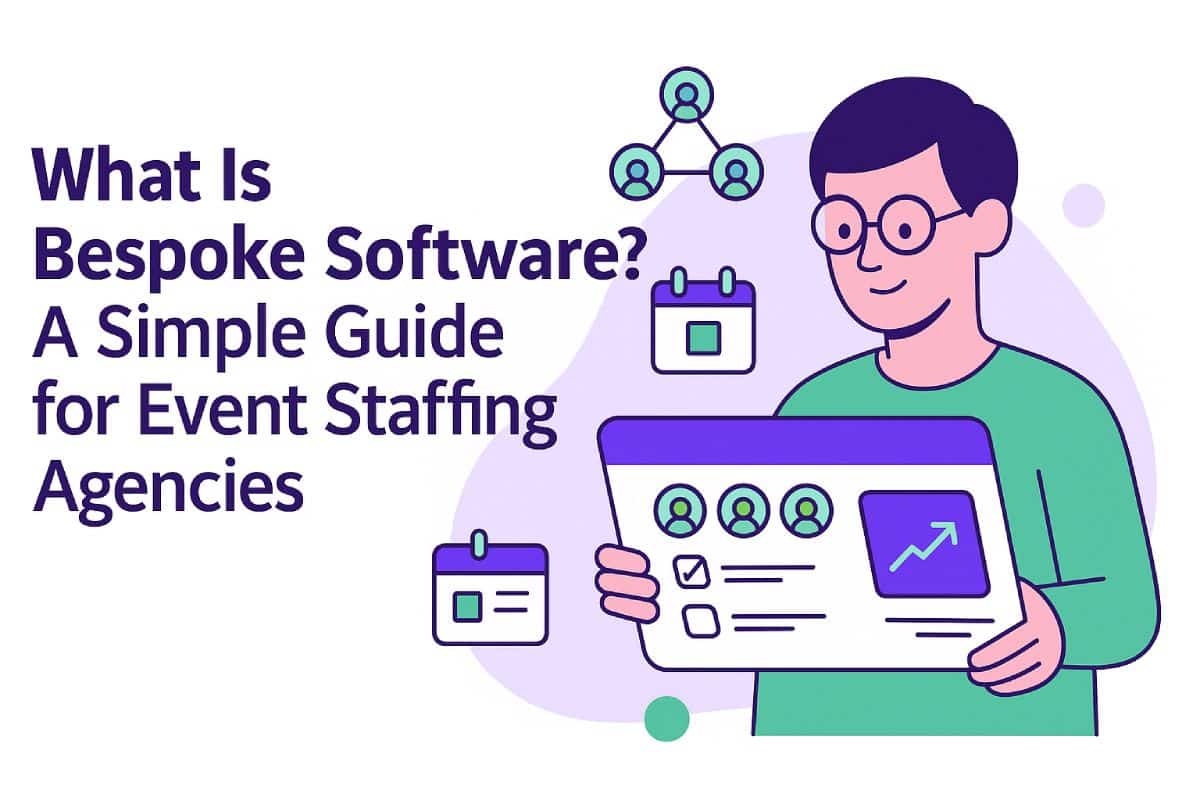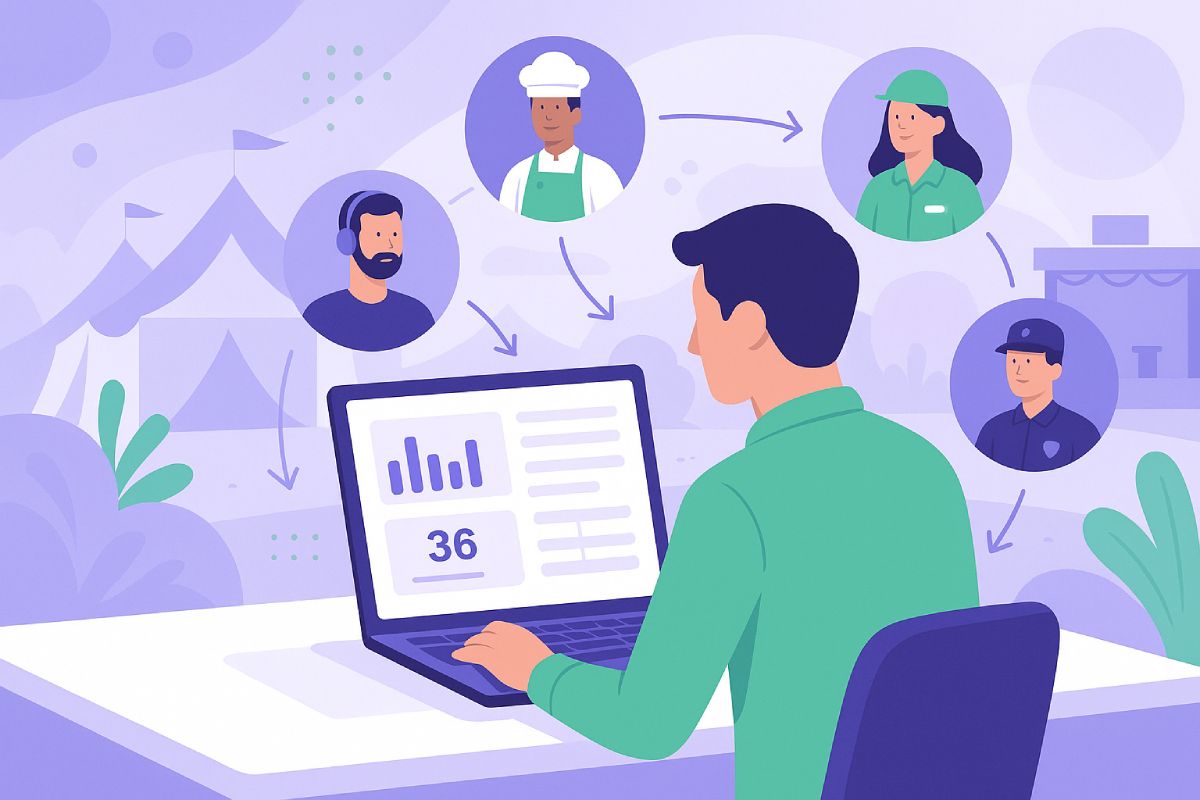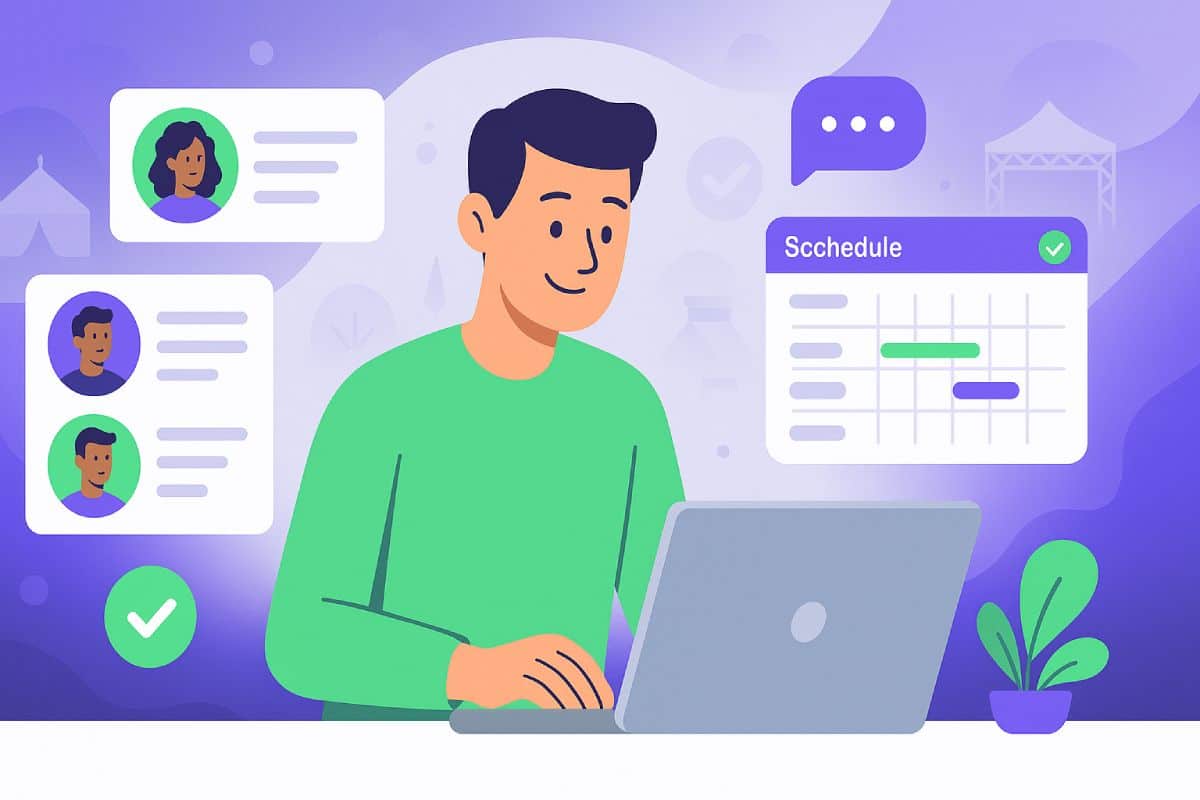If you’ve ever juggled spreadsheets, WhatsApp messages, and last-minute crew changes, you’ll know how hard it is to keep everything running smoothly. You may have heard the term bespoke software and wondered if that could solve your problems.
But what is bespoke software, really – and is it the right choice for your agency?
This guide breaks down what bespoke software means, how it compares to SaaS tools like Liveforce, and what event staffing agencies should consider before deciding which route to take.
What Is Bespoke Software?
In simple terms, bespoke software is custom-built software created specifically for one organisation’s unique needs. Unlike off-the-shelf or SaaS (Software-as-a-Service) platforms, which are designed for many users, bespoke systems are designed and developed from scratch for a single business.
Think of it like commissioning a tailor-made suit rather than buying one off the rack. Every feature, integration, and interface is created to fit your exact requirements.
Key traits of bespoke software:
- Customised from the ground up
- Owned outright by your business
- Designed around specific workflows
- Developed by a software agency or internal team
- Scalable based on your growth
While this sounds ideal, bespoke software comes with both strengths and limitations – especially for event staffing and workforce management.
Bespoke Software Meaning for Event Staffing Agencies
So, in the context of event staffing, what is bespoke software really used for?
For agencies managing hundreds of temporary workers, bespoke software might be developed to handle:
- Crew scheduling and availability tracking
- Timesheet approvals and payments
- Compliance management (e.g. right-to-work documents)
- Automated client billing and reporting
Essentially, a bespoke platform could unify the processes you currently manage through multiple tools. The goal is to build something that reflects your unique workflow and data structure.
However, before you get too excited, it’s important to weigh the costs, time, and maintenance involved.

How Bespoke Software Works
Bespoke software is typically built through a structured development process:
- Discovery and scoping – Developers map out your business needs and create technical specifications.
- Design and prototyping – Wireframes and mock-ups are shared to visualise how the system will look.
- Development – Engineers build and test the product in iterations.
- Deployment and integration – The system is launched and linked with existing tools.
- Support and updates – Ongoing maintenance, bug fixes, and feature requests are managed.
This can take anywhere from six months to several years, depending on complexity. The cost can range from tens to hundreds of thousands of pounds – and that’s before factoring in future upgrades.
Bespoke Software Examples
To make this more concrete, here are a few bespoke software examples that might sound familiar in the event industry:
- A large festival organiser is commissioning a custom event-crew booking system linked to their payroll software.
- A hospitality staffing agency is creating an internal portal to track shifts and invoices across multiple venues.
- A production company is developing its own project management and compliance platform for freelancers.
Each example shows how bespoke software can solve highly specific problems – but also highlights that these solutions are often expensive and complex to maintain.
The Benefits of Bespoke Software
For some organisations, bespoke software can deliver real value. Let’s look at the main benefits:
1. Tailored to Your Business
Every workflow, report, and field can be shaped around your exact requirements – no redundant features or generic layouts.
2. Complete Ownership
You fully own the software, so you’re not tied to a vendor or ongoing subscription model. That gives long-term control over data and features.
3. Competitive Advantage
A well-designed bespoke system could give your agency an operational edge – for example, through unique automation or data insights.
4. Scalable on Your Terms
As your business grows, developers can extend the system to support more users, features, or integrations.

The Challenges of Bespoke Software
While it’s appealing to have something built “just for you”, bespoke software also comes with significant challenges:
1. High Development Costs
Creating bespoke software is expensive. Development alone can cost as much as hiring a small internal team for a year.
2. Long Build Time
Custom projects often take months or years before you see a working version – not ideal if you need quick results.
3. Maintenance Burden
You’ll need to budget for ongoing updates, hosting, and technical support. If your developer moves on, finding replacements can be difficult.
4. Security and Compliance
You become responsible for ensuring GDPR compliance, data protection, and system uptime. SaaS providers usually handle this for you.
5. Limited Flexibility Over Time
Ironically, once built, bespoke systems can become less flexible. Updating or redesigning the platform later can be complex and costly.
Bespoke vs SaaS: Which Works Best for Event Staffing?
If you’re weighing up your options, it’s worth understanding how bespoke software compares with modern SaaS platforms like Liveforce.
Feature | Bespoke Software | SaaS Software |
Setup Time | Long (months or years) | Quick (instant access) |
Cost | High upfront investment | Subscription-based |
Flexibility | Custom-built but harder to change later | Highly configurable with regular updates |
Maintenance | Your responsibility | Managed by provider |
Scalability | Requires developer input | Scales automatically |
Compliance | Must be handled internally | Typically built-in (GDPR-ready) |
In most cases, SaaS software provides 80–90% of what bespoke systems promise – at a fraction of the cost and complexity.
Why Event Staffing Agencies Often Choose SaaS Over Bespoke
Let’s be realistic. Most event staffing agencies don’t need to reinvent the wheel. The main issues they face – scheduling, compliance, payments, and communication – are already solved by proven SaaS tools.
Here’s why SaaS (like Liveforce) often makes more sense:
- Instant Access – You can be up and running in days, not months.
- Continuous Improvements – SaaS products evolve based on user feedback and industry needs.
- Cost Predictability – Pay a regular subscription instead of unpredictable development fees.
- Data Security – SaaS platforms are GDPR-compliant and handle security for you.
- Scalability – Add users or projects instantly without redeveloping your system.
You still enjoy flexibility through configuration, automation, and integrations – without the drawbacks of bespoke development.
Addressing Common Myths About Bespoke Software
Myth 1: “Bespoke software fits my business perfectly.”
In theory, yes – but businesses evolve. What fits today may not suit you in two years. SaaS tools adapt faster and more cost-effectively.
Myth 2: “Owning my software means I’m saving money long term.”
Ownership brings responsibility: updates, hosting, and bug fixes. Over five years, bespoke systems often cost more than SaaS subscriptions.
Myth 3: “SaaS tools can’t meet our specific needs.”
Modern SaaS solutions like Liveforce are highly configurable. From custom fields to automated workflows, they can replicate many bespoke features.
When Does Bespoke Software Make Sense?
There are times when bespoke software is the right choice. For example:
- You have a highly unique operational model.
- Off-the-shelf tools can’t integrate with legacy systems.
- You’re developing a product that’s part of your competitive advantage.
If your software is your business, bespoke development can make sense. But for most event staffing agencies, SaaS offers a more practical path.

How Bespoke Software Differs from Customisable SaaS
A common confusion is between bespoke and customisable SaaS. While bespoke means built from scratch, SaaS tools like Liveforce allow a high degree of personalisation without full custom development.
You can:
- Add custom job types, pay rates, and documents
- Configure workflows to match your approval processes
- Brand the system with your logo and colours
- Automate notifications and reporting
That’s the balance most agencies need – flexibility without the complexity or cost of full bespoke software.
The Rise of Digital Transformation in Staffing
The global staffing and event management software market continues to grow rapidly.
According to Staffing Industry Analysts (SIA), digital workforce platforms are transforming how agencies manage temporary staff. In the UK alone, temporary staffing contributes over £30 billion annually, and automation is now key to maintaining efficiency and compliance.
As agencies modernise, the trend is clear: more are turning to cloud-based SaaS platforms rather than investing in costly bespoke builds. These tools support hybrid teams, streamline compliance, and provide real-time visibility across projects – vital in the fast-moving events sector.
Choosing the Right Software for Your Agency
When deciding between bespoke and SaaS software, ask yourself:
- What’s my core need?
- Do you need a unique product or a reliable solution to manage staff and events?
- How quickly do I need results?
- Can you wait months for development, or do you need to improve workflows immediately?
- What’s my total cost of ownership?
- Include updates, hosting, and maintenance – not just initial build costs.
- Who will maintain it?
- Do you have in-house IT support to manage bespoke software?
- How fast is my business changing?
- SaaS tools evolve with you; bespoke systems require manual updates.
Answering these questions will make your decision clearer.
How Liveforce Delivers the Best of Both Worlds
Liveforce was designed specifically for event staffing agencies that want flexibility and control without the challenges of bespoke software. It provides:
- Centralised scheduling across multiple clients and projects
- Real-time communication with your crew through the mobile app
- Compliance tracking with document verification and role-specific requirements
- Automated payments and invoicing
- Configurable workflows and branding
You get the tailored experience you’d expect from bespoke software, plus the reliability, updates, and scalability of SaaS.
That’s why leading hospitality and event agencies across the UK and Europe trust Liveforce to manage their workforce – efficiently, compliantly, and confidently.
Key Takeaways
- What is bespoke software? Custom-built systems created for a specific organisation.
- When it fits: Highly unique operations or products that require proprietary solutions.
- When SaaS is better: For most event staffing agencies, SaaS like Liveforce offers faster setup, lower costs, and ongoing innovation.
Your goal: Find a system that enhances efficiency, reduces manual work, and supports your team growth – without unnecessary complexity.
Understanding what bespoke software is helps you make informed decisions about your agency’s future technology. While bespoke systems offer customisation and control, they often come with high costs and long timelines.
SaaS tools such as Liveforce now deliver the flexibility agencies once sought from bespoke solutions – at a predictable cost and with continuous improvement.
If your goal is to simplify scheduling, boost communication, and scale operations seamlessly, SaaS is the smarter choice.
Ready to see how Liveforce can transform your agency?
FAQs
What is bespoke software?
Bespoke software is a custom-built system designed specifically for one business’s unique needs. Unlike off-the-shelf or SaaS tools, it’s developed from scratch to match your workflows and requirements.
How does bespoke software differ from SaaS?
Bespoke software is fully customised but costly and time-consuming to develop, while SaaS (Software-as-a-Service) provides ready-to-use, configurable tools that are faster to deploy and regularly updated by the provider.
Is bespoke software right for event staffing agencies?
For most agencies, SaaS solutions like Liveforce offer the flexibility and automation of bespoke software without the high cost or long build time. Bespoke systems usually suit organisations with very specific or complex needs.
What are the main disadvantages of bespoke software?
Bespoke systems require high upfront investment, long development times, and ongoing maintenance. They can also be harder to update compared with SaaS platforms that evolve automatically.
Is Liveforce a bespoke or SaaS platform?
Liveforce is a SaaS-based workforce management platform built for event staffing and hospitality agencies. It offers customisable workflows, real-time crew communication, and compliance tracking, without the complexity of bespoke software.




